Reef frequented by whale sharks “destroyed” by resort’s excavation work
Excavation work carried out by LUX South Ari Atoll to clear a snorkelling channel on the island’s barrier reef has destroyed live corals, altered the current flow, and escalated the rate of erosion, divers say. It was approved by the tourism ministry after the resort’s proposal was twice rejected by the environment ministry.

07 Dec 2015, 09:00
Excavation work carried out by LUX South Ari Atoll to clear a snorkelling channel on the resort’s barrier reef has destroyed protected corals and damaged the marine environment, the Divers Association of Maldives has claimed.
Expressing “grave concern” over the negative environmental impact in a statement yesterday, DAM said the use of machinery to clear the channel has destroyed corals and “a significant portion of the reef,” which is located in the South Ari Marine Protected Area, frequented by whale sharks.
The luxury resort has since halted the excavation work.
A PR official told The Maldives Independent today that the resort realised that “more intrusive work would be required to achieve a channel depth similar to the one indicated in the [Environment Impact Assessment]” conducted to secure approval from the government.
Become a member
Get full access to our archive and personalise your experience.
Already a member?
Discussion
No comments yet. Be the first to share your thoughts!
No comments yet. Be the first to join the conversation!
Join the Conversation
Sign in to share your thoughts under an alias and take part in the discussion. Independent journalism thrives on open, respectful debate — your voice matters.




